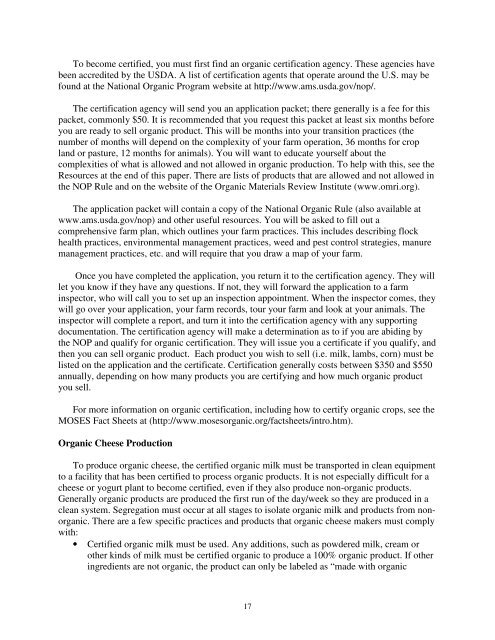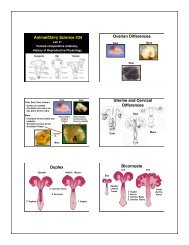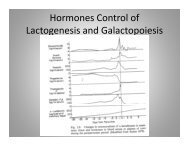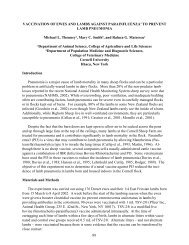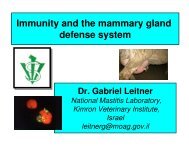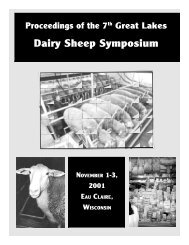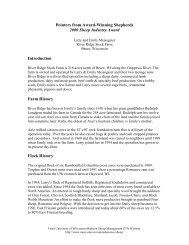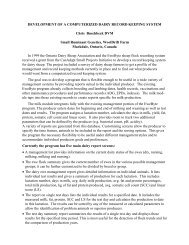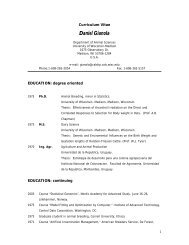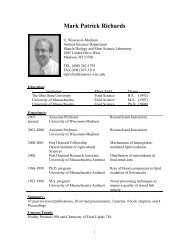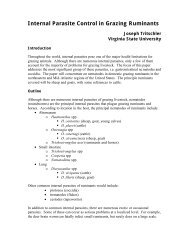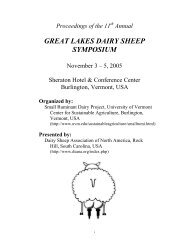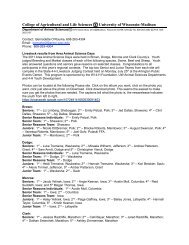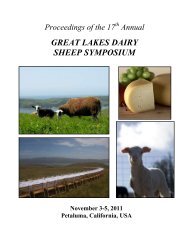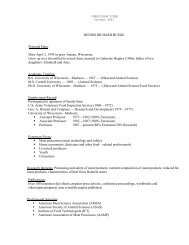great lakes dairy sheep symposium - the Department of Animal ...
great lakes dairy sheep symposium - the Department of Animal ...
great lakes dairy sheep symposium - the Department of Animal ...
You also want an ePaper? Increase the reach of your titles
YUMPU automatically turns print PDFs into web optimized ePapers that Google loves.
To become certified, you must first find an organic certification agency. These agencies have<br />
been accredited by <strong>the</strong> USDA. A list <strong>of</strong> certification agents that operate around <strong>the</strong> U.S. may be<br />
found at <strong>the</strong> National Organic Program website at http://www.ams.usda.gov/nop/.<br />
The certification agency will send you an application packet; <strong>the</strong>re generally is a fee for this<br />
packet, commonly $50. It is recommended that you request this packet at least six months before<br />
you are ready to sell organic product. This will be months into your transition practices (<strong>the</strong><br />
number <strong>of</strong> months will depend on <strong>the</strong> complexity <strong>of</strong> your farm operation, 36 months for crop<br />
land or pasture, 12 months for animals). You will want to educate yourself about <strong>the</strong><br />
complexities <strong>of</strong> what is allowed and not allowed in organic production. To help with this, see <strong>the</strong><br />
Resources at <strong>the</strong> end <strong>of</strong> this paper. There are lists <strong>of</strong> products that are allowed and not allowed in<br />
<strong>the</strong> NOP Rule and on <strong>the</strong> website <strong>of</strong> <strong>the</strong> Organic Materials Review Institute (www.omri.org).<br />
The application packet will contain a copy <strong>of</strong> <strong>the</strong> National Organic Rule (also available at<br />
www.ams.usda.gov/nop) and o<strong>the</strong>r useful resources. You will be asked to fill out a<br />
comprehensive farm plan, which outlines your farm practices. This includes describing flock<br />
health practices, environmental management practices, weed and pest control strategies, manure<br />
management practices, etc. and will require that you draw a map <strong>of</strong> your farm.<br />
Once you have completed <strong>the</strong> application, you return it to <strong>the</strong> certification agency. They will<br />
let you know if <strong>the</strong>y have any questions. If not, <strong>the</strong>y will forward <strong>the</strong> application to a farm<br />
inspector, who will call you to set up an inspection appointment. When <strong>the</strong> inspector comes, <strong>the</strong>y<br />
will go over your application, your farm records, tour your farm and look at your animals. The<br />
inspector will complete a report, and turn it into <strong>the</strong> certification agency with any supporting<br />
documentation. The certification agency will make a determination as to if you are abiding by<br />
<strong>the</strong> NOP and qualify for organic certification. They will issue you a certificate if you qualify, and<br />
<strong>the</strong>n you can sell organic product. Each product you wish to sell (i.e. milk, lambs, corn) must be<br />
listed on <strong>the</strong> application and <strong>the</strong> certificate. Certification generally costs between $350 and $550<br />
annually, depending on how many products you are certifying and how much organic product<br />
you sell.<br />
For more information on organic certification, including how to certify organic crops, see <strong>the</strong><br />
MOSES Fact Sheets at (http://www.mosesorganic.org/factsheets/intro.htm).<br />
Organic Cheese Production<br />
To produce organic cheese, <strong>the</strong> certified organic milk must be transported in clean equipment<br />
to a facility that has been certified to process organic products. It is not especially difficult for a<br />
cheese or yogurt plant to become certified, even if <strong>the</strong>y also produce non-organic products.<br />
Generally organic products are produced <strong>the</strong> first run <strong>of</strong> <strong>the</strong> day/week so <strong>the</strong>y are produced in a<br />
clean system. Segregation must occur at all stages to isolate organic milk and products from nonorganic.<br />
There are a few specific practices and products that organic cheese makers must comply<br />
with:<br />
• Certified organic milk must be used. Any additions, such as powdered milk, cream or<br />
o<strong>the</strong>r kinds <strong>of</strong> milk must be certified organic to produce a 100% organic product. If o<strong>the</strong>r<br />
ingredients are not organic, <strong>the</strong> product can only be labeled as “made with organic<br />
17


